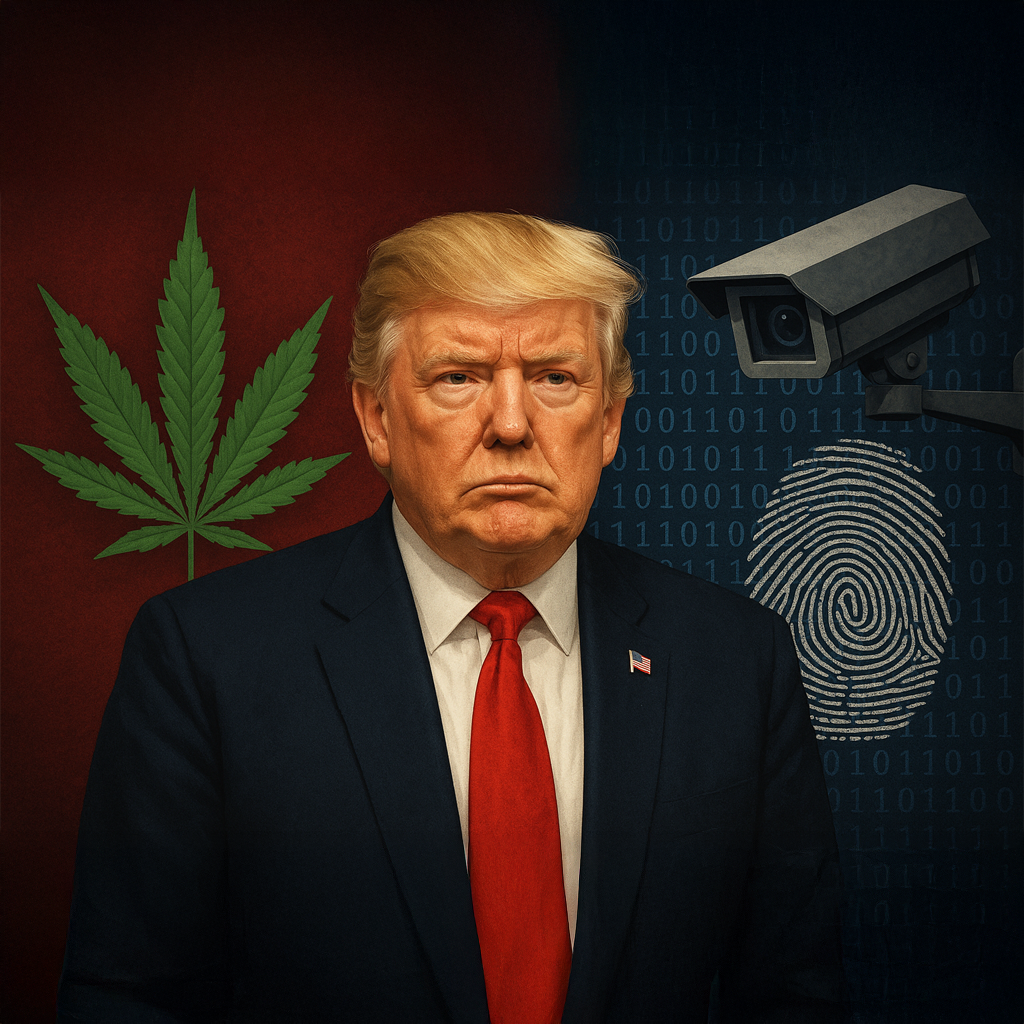Trump’s reversal on medical marijuana protections and push for expanded surveillance reveal a deeper agenda prioritizing corporate control over public health and civil liberties.
President Donald Trump’s latest budget proposal reveals a stark contradiction between campaign promises and governing reality, as his administration seeks to eliminate longstanding protections for state medical marijuana programs while simultaneously expanding federal surveillance capabilities.
Cannabis restrictions and surveillance have long gone hand in hand, with government agencies using the War on Drugs as a justification for invasive monitoring, targeting not only traffickers but patients, caregivers, and small-scale growers under the guise of public safety.
The proposed rollback of protections, paired with enhanced digital surveillance infrastructure, revives this legacy—modernizing it with predictive algorithms and data-mining tools capable of identifying and flagging cannabis-related behaviors across state lines, regardless of legality.
This dual approach represents more than policy inconsistency – it signals a fundamental shift toward centralized federal control that undermines both public health access and civil liberties. The implications extend far beyond cannabis policy, touching on constitutional questions of states’ rights, corporate influence in policymaking, and the delicate balance between security and freedom in American democracy.
The Great Cannabis Policy Betrayal
Trump’s approach to cannabis policy exemplifies the gap between electoral rhetoric and administrative action. During his campaign, Trump expressed support for medical marijuana programs and even endorsed Florida’s adult-use legalization ballot initiative, creating expectations among cannabis advocates that federal reform might finally be within reach. These statements resonated with voters who saw an opportunity for meaningful change in federal cannabis policy after decades of prohibition.
However, Trump’s 2026 fiscal year budget request tells a different story entirely. The proposal seeks to eliminate the longstanding rider that has protected state medical marijuana programs from federal interference since 2014. This represents Trump’s renewed effort to delete protections he consistently opposed during his first term, despite Congress repeatedly maintaining these safeguards in appropriations legislation.
The political theater surrounding the issue reveals a calculated strategy to capture cannabis voters during election cycles while maintaining policies that serve different interests once in office. This pattern demonstrates how campaign rhetoric can be weaponized to build electoral coalitions that are later abandoned when governing priorities shift toward corporate and institutional preferences.
The Erosion of Medical Marijuana Protections
The proposed elimination of medical marijuana protections would expose millions of patients to potential federal prosecution for accessing treatments that have been legal under state law for over a decade. The 2014 rider has provided crucial legal cover for state-run medical cannabis programs, allowing patients with serious conditions including cancer, epilepsy, PTSD and chronic pain to access alternative treatments without fear of federal intervention.
This policy reversal would force patients back toward traditional pharmaceutical options that may be less effective, more expensive, or carry higher risks of dependency. The human cost of such a shift extends beyond individual health outcomes to encompass broader questions of medical autonomy and state sovereignty in healthcare decisions.
Interestingly, the proposed changes would maintain protections for hemp-derived CBD products, creating an arbitrary distinction that serves to protect certain commercial interests while exposing others to federal enforcement. This selective approach suggests that cannabis policy decisions are being driven more by corporate lobbying and pharmaceutical industry pressure than by scientific evidence or patient welfare considerations.
Surveillance State Expansion Under Cover of Security
Concurrent with the attack on medical marijuana protections, Trump’s budget proposal includes significant expansions of federal surveillance capabilities designed to enhance citizen tracking through integrated data systems. These measures represent a fundamental shift toward comprehensive monitoring that extends far beyond traditional law enforcement applications into the realm of social control.
The proposed surveillance infrastructure would integrate multiple data sources including social media activity, financial transactions, and geolocation information to create detailed personal profiles of American citizens. Technologies originally developed for counter-terrorism purposes are being repurposed for domestic surveillance, raising serious questions about the appropriate scope of government monitoring in a democratic society.
Advanced analytics platforms like those developed by Palantir Technologies would play a central role in this expanded surveillance ecosystem, providing government agencies with unprecedented capabilities to track, analyze and predict citizen behavior. The integration of these systems across multiple federal agencies creates opportunities for surveillance overreach that fundamentally alters the relationship between citizens and their government.
Privacy Rights in the Digital Age
The expansion of federal surveillance capabilities poses direct threats to civil liberties and privacy rights that have traditionally been protected under constitutional principles. The ability to merge government data across agencies to create comprehensive personal profiles mirrors surveillance models employed by authoritarian regimes, particularly China’s social credit system that monitors and scores citizen behavior.
For cannabis users and medical marijuana advocates, enhanced surveillance presents particular risks as their activities could be monitored and flagged even when conducted in compliance with state law. This creates a chilling effect on legitimate political expression and medical treatment decisions, effectively criminalizing behavior that should be protected under principles of medical privacy and political freedom.
The broader implications extend to all forms of dissent and political activism, as comprehensive surveillance capabilities can be used to identify, track and potentially intimidate citizens who engage in activities that challenge government policies or corporate interests.
The Cannabis Policy-Surveillance Nexus
The simultaneous rollback of medical cannabis protections and expansion of surveillance capabilities represents a coordinated approach to expanding federal control over both healthcare decisions and personal privacy. These policy shifts work in tandem to restrict individual autonomy while enhancing government power to monitor and control citizen behavior.
Cannabis policy serves as a particularly effective vehicle for surveillance expansion because it creates legally ambiguous situations where federal and state laws conflict. Citizens who use medical marijuana in compliance with state law remain vulnerable to federal prosecution, creating opportunities for selective enforcement that can be used to target political opponents or social groups deemed undesirable by authorities.
The narrative of public safety is frequently invoked to justify both cannabis prohibition and surveillance expansion, despite evidence that suggests neither policy effectively serves public health or security interests. Instead, these policies appear designed to serve corporate interests in the pharmaceutical and security technology sectors while expanding government control over personal decisions.
Crisis Exploitation and Policy Justification
Recent events including civil unrest in California have been leveraged to justify broader surveillance implementations through classic problem-reaction-solution political strategies. Crisis situations create opportunities for policymakers to implement previously unpopular measures under the guise of emergency response, often with insufficient public debate or oversight.
This pattern reveals how manufactured or exploited crises can serve as vehicles for advancing pre-existing policy agendas that serve corporate and institutional interests rather than genuine public safety concerns. The expansion of surveillance capabilities often persists long after the initial crisis has passed, creating permanent alterations to the balance of power between citizens and government.
Corporate Capture and Political Theater
The selective targeting of medical marijuana while protecting hemp-derived CBD products reveals the influence of pharmaceutical industry lobbying in shaping cannabis policy. Traditional pharmaceutical companies benefit significantly from policies that restrict access to cannabis-based treatments while protecting their market share in pain management and other therapeutic areas.
The movement of cannabis to Schedule III of the Controlled Substances Act creates new opportunities for pharmaceutical companies to develop and market cannabis-based prescription drugs while maintaining barriers to patient access through state medical marijuana programs. This regulatory structure serves corporate interests by channeling cannabis access through traditional pharmaceutical distribution systems rather than state-regulated dispensaries.
Corporate influence extends beyond the pharmaceutical sector to include surveillance technology companies that benefit from expanded government contracts for monitoring and data analysis services. The intersection of these corporate interests creates powerful lobbying coalitions that can influence policy development in ways that serve profit margins rather than public interest.
Media Narratives and Public Perception
Media coverage of cannabis policy and surveillance issues often fails to adequately explore the connections between these policy areas or to critically examine the corporate interests that drive policy development. Selective reporting tends to focus on isolated studies of cannabinoids or dramatic narratives about surveillance capabilities without providing comprehensive analysis of how these policies work together to restrict individual freedoms.
The manipulation of public perception through strategic media campaigns allows policymakers to maintain support for contradictory policies by presenting them in isolation rather than as components of a broader control strategy. This fragmented approach to reporting prevents the public from understanding the full implications of policy changes and their interconnected effects on civil liberties and public health.
Constitutional and Democratic Implications
The proposed elimination of medical marijuana protections raises fundamental questions about the balance of power between federal and state governments in areas traditionally reserved to state authority. Healthcare regulation has historically been a state responsibility, and federal interference in state medical marijuana programs represents a significant expansion of federal power into traditionally local domains.
Legal challenges to federal interference in state cannabis programs are likely to emerge if these protections are eliminated, potentially creating Supreme Court cases that could reshape the balance of federal and state authority more broadly. These constitutional questions extend beyond cannabis policy to encompass broader principles of federalism and local self-governance.
The expansion of federal surveillance capabilities also raises constitutional questions about the scope of government power to monitor citizens without specific warrants or probable cause. The integration of multiple data sources to create comprehensive personal profiles may violate Fourth Amendment protections against unreasonable searches and seizures.
Democratic Participation and Civil Liberties
Comprehensive surveillance capabilities pose direct threats to democratic participation by creating chilling effects on political expression and association. Citizens who know their activities are being monitored may self-censor their political views or avoid participating in advocacy organizations, effectively suppressing the democratic process.
The combination of restricted access to medical treatments and enhanced surveillance creates multiple pressure points where government power can be used to influence citizen behavior and political participation. These mechanisms of control undermine the fundamental principles of democratic governance by restricting the freedom necessary for informed political participation.
Economic and Public Health Consequences
Ironically, Trump’s broader budget cuts to federal programs may actually accelerate state-level marijuana legalization as states seek new revenue sources to offset reduced federal funding. States facing increased responsibility for programs like SNAP and Medicaid may turn to cannabis tax revenue to balance their budgets, creating economic incentives for legalization that override federal opposition.
This dynamic reveals the contradictory nature of the administration’s approach, as budget cuts designed to reduce federal spending may ultimately undermine federal cannabis prohibition by forcing states to seek alternative revenue sources. The economic pressure created by federal budget cuts could prove more powerful than policy rhetoric in driving cannabis reform at the state level.
Healthcare Access and Patient Welfare
The elimination of medical marijuana protections would force patients to choose between compliance with federal law and access to treatments that may be more effective or have fewer side effects than traditional pharmaceuticals. This creates untenable situations for seriously ill patients who have found relief through state-legal medical cannabis programs.
The public health implications extend beyond individual patient care to encompass broader questions about healthcare costs and treatment effectiveness. Studies suggest that medical marijuana access can reduce prescription opioid use and healthcare costs, making its restriction potentially counterproductive from both health and economic perspectives.
Grassroots Resistance and Advocacy Strategies
Successful grassroots activism has historically played a crucial role in advancing cannabis policy reform, from the early medical marijuana initiatives in California to the recent wave of adult-use legalization measures across multiple states. Organizations like NORML have demonstrated the effectiveness of sustained advocacy in changing public opinion and policy outcomes1.
The current policy threats create opportunities for renewed grassroots mobilization that could build broader coalitions connecting cannabis advocates with privacy rights organizations and civil liberties groups. The intersection of these issues provides a foundation for building political movements that address multiple aspects of government overreach simultaneously.
Digital Advocacy and Legal Challenges
Modern advocacy strategies must account for the digital surveillance capabilities that may be used to monitor and disrupt advocacy activities. Secure communication tools and privacy-protecting technologies become essential components of effective advocacy in an environment where government surveillance poses direct threats to political organizing.
Legal challenges to both cannabis policy restrictions and surveillance expansions will require sustained funding and coordination across multiple organizations and jurisdictions. Strategic litigation can serve both immediate policy goals and broader educational purposes by raising public awareness of the connections between these policy areas.
Future Projections and Strategic Considerations
The trajectory of cannabis policy under the Trump administration appears likely to create increasing tensions between federal enforcement and state-level legalization efforts. As more states implement cannabis programs and federal restrictions increase, constitutional conflicts will become more pronounced and potentially require Supreme Court resolution.
Surveillance capabilities will continue expanding regardless of specific cannabis policies, as technological development and corporate interests drive adoption of new monitoring systems. The integration of artificial intelligence and machine learning into surveillance systems will create even more sophisticated capabilities for citizen monitoring and behavior prediction.
International Comparisons and Lessons
Global trends toward cannabis legalization and privacy protection provide alternative models that highlight the regressive nature of current U.S. federal policies. Countries like Canada and Netherlands have demonstrated that cannabis legalization can coexist with effective public health and safety measures, while European privacy regulations like GDPR provide frameworks for protecting citizen data rights.
These international examples provide both policy blueprints and political ammunition for advocates seeking to reform U.S. approaches to both cannabis policy and surveillance regulation. Comparative analysis can demonstrate that alternative approaches are not only possible but often more effective in serving genuine public health and safety goals.
Safeguarding Liberty in the Age of Contradiction
The Trump administration’s approach to cannabis policy reveals a troubling pattern of promises made and broken, corporate interests prioritized over public health, and federal power expanded at the expense of individual liberty and state autonomy. The proposed elimination of medical marijuana protections while expanding surveillance capabilities represents more than policy inconsistency – it signals a fundamental shift toward centralized control that undermines democratic principles and constitutional protections.
The intersection of cannabis policy and surveillance expansion creates multiple threats to civil liberties and public health that require coordinated resistance from advocates, legal challenges from constitutional lawyers, and sustained pressure from informed citizens who understand the broader implications of these policy changes. The stakes extend far beyond access to medical marijuana to encompass fundamental questions about the relationship between citizens and government in American democracy.
Moving forward, the cannabis policy debate must be understood as part of a broader struggle over privacy rights, healthcare autonomy, and democratic participation. Only through sustained advocacy that connects these issues can citizens hope to preserve the freedoms that make democratic self-governance possible while ensuring access to effective medical treatments for those who need them most.

***
GreenPharms is more than just a dispensary. We are a family-owned and operated company that cultivates, processes, and sells high-quality cannabis products in Arizona. Whether you are looking for medical or recreational marijuana, we have something for everyone. From flower, edibles, concentrates, and topicals, to accessories, apparel, and education, we offer a wide range of marijuana strains, products and services to suit your needs and preferences. Our friendly and knowledgeable staff are always ready to assist you and answer any questions you may have. Visit our dispensaries in Mesa and Flagstaff, or shop online and get your order delivered to your door. At GreenPharms, we are cultivating a different kind of care.
Follow us on social media





